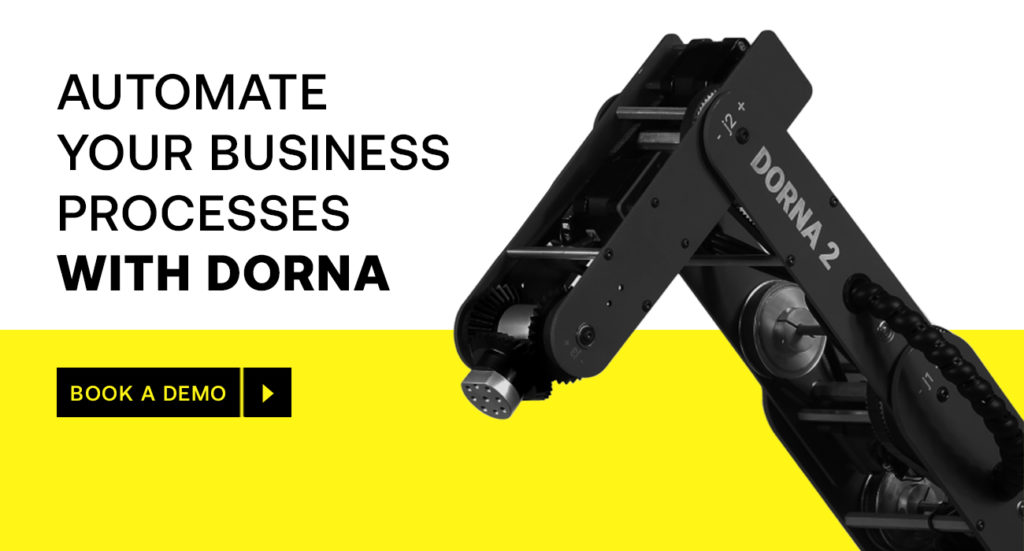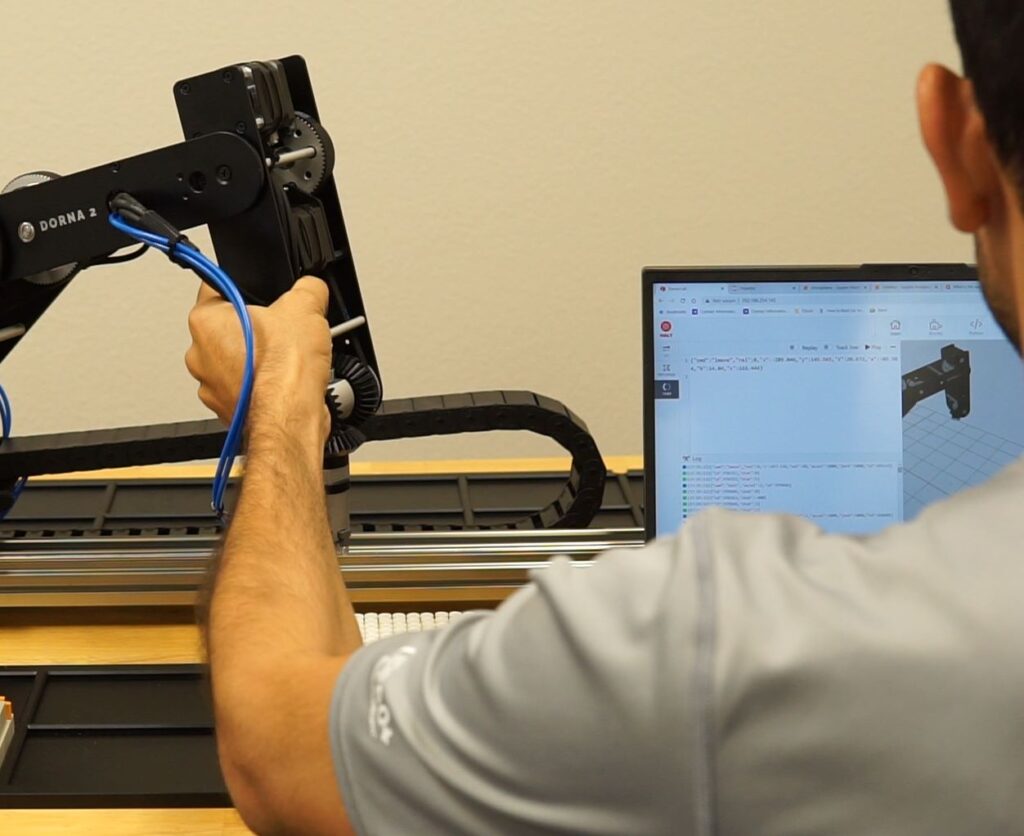Blogs, Products
Top Applications Of Robotic Arms
Robotic arms, also known as manipulators, are versatile mechanical limbs that are programmed to perform tasks with unparalleled speed, accuracy,…
43 minute read
In This Article
In an era defined by the dynamic evolution of future demands, the integration of cutting-edge technologies has become an imperative force driving progress. This is why we stand on the precipice of an era dominated by automation, and the role of educators too, as a result, transcends traditional boundaries.
Beyond the confines of textbooks and traditional teaching methods, collaborative and safe robotic arms today present a gateway to hands-on learning experiences that not only captivate the imagination of students but also pave the way for a future marked by automation.
This blog sheds light on Dorna robots’ capacity to enhance hands-on learning and equip students with the skills needed to navigate the automation-driven landscape that lies ahead. Tailored specifically for educators, this guide aims to unlock the untapped potential within classrooms, empowering students to confidently face the challenges and seize the opportunities that await beyond the school gates.
In the contemporary education landscape, traditional methodologies are increasingly facing challenges in meeting the dynamic needs of both students and the job market. As the global workforce transforms in the wake of automation, there is a growing recognition that students must be equipped with more than just academic knowledge.
The conventional “chalk and talk” approach, while foundational, often falls short in fostering the practical skills required in a world deeply characterized by rapid technological advancements.
This recognition underscores the need for a paradigm shift in educational practices – a shift toward fostering an environment where students actively engage and apply their learnings. It is within this context that Dorna’s robot arms emerge as catalysts for change, offering a tangible solution to bridge the gap between theory and practical application.
Hands-on learning has long been recognized as a powerful educational tool, allowing students to move beyond theoretical understanding to practical application. The tactile experience of manipulating objects, experimenting, and solving real-world problems not only enhances comprehension but also cultivates critical thinking and problem-solving skills.
Traditional educational approaches, while foundational, often struggle to capture the attention and enthusiasm of today’s digitally immersed students. In a world inundated with information, the challenge is to create an educational experience that not only imparts knowledge but also sparks curiosity and creativity. Hands-on learning, by its very nature, addresses this challenge by providing a dynamic and interactive platform for students to explore, experiment, and discover.
Designed to transcend the boundaries of conventional learning, Dorna’s robot arms are versatile and programmable robotic tools that offer hands-on experience in the realms of robotics, automation, and programming. These compact yet powerful devices open new avenues for educators seeking to provide students with a practical and engaging learning experience.
Our robots have several features that make them particularly suitable for educational environments. They’re safe, collaborative, easy to use, adaptable, and accessible for students at various educational levels. These robotic arms can be programmed to perform a myriad of tasks, from simple movements to complex sequences, allowing students to interact with technology in a way that goes beyond traditional classroom boundaries.
Dorna robot arms stand at the forefront of a new era in education, where hands-on learning takes a quantum leap forward. Their integration into classrooms opens a myriad of possibilities, enriching the educational experience for students and educators alike. These are some features that make Dorna an ideal education partner:
Dorna’s user-friendly interface allows students to dive into the world of programming without intimidation. Through interactive programming, students can experiment with coding and gain a practical understanding of how commands translate into robotic movements. This hands-on coding experience not only demystifies programming but also fosters a sense of empowerment and accomplishment among students.
One of the defining features of Dorna is its adaptability to real-world applications. From assembling small structures to mimicking industrial tasks, Dorna offers a tangible connection between theoretical concepts and their practical implementation. Students can witness firsthand the applications of robotics in industries such as manufacturing, healthcare, and even space exploration, broadening their understanding of the potential impact of their learning.
Dorna is not just a tool; it’s a collaborative learning companion. Its integration encourages teamwork, problem-solving, and communication skills. Students can work together to design, program, and execute tasks, fostering a spirit that mirrors the collaborative nature of many modern workplaces.
Dorna extends its educational reach beyond the physical realm through simulation and virtual learning capabilities via the Dorna lab. Students can experiment with programming and test their algorithms in a virtual environment before applying them to the physical robot arm. This not only enhances the learning experience but also allows for a safe and controlled space for trial and error, promoting a deeper understanding of programming logic.

Beyond the immediate benefits of enhanced hands-on learning, the integration of Dorna robot arms in educational settings plays a pivotal role in preparing students for the future landscape dominated by automation and technology.
Exposure to Dorna equips students with a heightened level of technological literacy. In navigating the complexities of programming and robotics, students develop a familiarity with technology that extends beyond mere consumption. This firsthand experience cultivates a comfort and confidence in interacting with technology, a skill set increasingly critical in our tech-driven world.
The challenges posed by programming Dorna robot arms necessitate a level of critical thinking and problem-solving that goes beyond theoretical understanding. Students must analyze problems, break them down into manageable components, and iteratively refine their solutions. These skills are not only applicable to robotics but are transferable to various aspects of life and future careers.
As industries continue to embrace automation, the ability to adapt to new technologies becomes a prized asset. Dorna’s integration prepares students to navigate the ever-evolving technological landscape. They graduate not only with theoretical knowledge but with a hands-on skill set that positions them as adaptable and future-ready individuals in the job market.
While the potential benefits of integrating Dorna into the classroom are evident, educators may understandably harbor concerns about the practicalities and impact on existing teaching methods.
One common concern is the perceived time constraints associated with introducing new technologies. Educators worry that learning to use and integrate Dorna might consume valuable classroom time, a concern that Dorna’s intuitive interface and user-friendly design alleviate. The learning curve for both educators and students is surprisingly gentle, allowing for efficient integration into existing curricula without significant disruptions.
Budget constraints often loom large in educational decision-making. However, the cost-effectiveness of Dorna, coupled with its versatility, makes it a worthwhile investment. Dorna’s durability and adaptability mean it can be utilized across multiple classes and academic years, providing an enduring resource for educators.
Educators may express concerns about their own technical proficiency in using and teaching with Dorna. Recognizing this, Dorna offers extensive support materials, including tutorials, lesson plans, and a responsive customer support system. Additionally, the collaborative learning environment fostered by Dorna allows educators and students to navigate the learning process together, fostering a sense of shared discovery.
Dorna seamlessly integrates into existing frameworks, supported by accessible resources and assistance. This ensures that educators can harness Dorna’s transformative potential without compromising the efficiency and coherence of their teaching methodologies.

For educators contemplating the integration of Dorna, it’s crucial to recognize that this isn’t a departure from traditional teaching methods but an evolution.
The integration of Dorna’s robot arms into educational settings propels us into an era where hands-on learning experiences are not just a supplement but the cornerstone of academic enrichment. Dorna seamlessly aligns with existing curricula, enhances hands-on learning, and addresses the very skills that will define success in the automated future — adaptability, critical thinking, and technological proficiency.
As we envision the classrooms of tomorrow, Dorna stands as a beacon, illuminating the path toward a future where students aren’t just passive recipients of knowledge but active participants in their own education.
Transform education with Dorna today!
Blogs, Products
Robotic arms, also known as manipulators, are versatile mechanical limbs that are programmed to perform tasks with unparalleled speed, accuracy,…
43 minute read
Blogs
Robotics is now an integral part of daily life, reaching beyond industries into our homes. Within the intricate world of…
20 minute read
Blogs
In this blog, we delve into the domain of palletizing robots, outlining their purpose and operation, and exploring how they…
24 minute read
Blogs
This blog aims to explore the essence of pick and place robots, providing a comprehensive understanding of their components, operational…
30 minute read